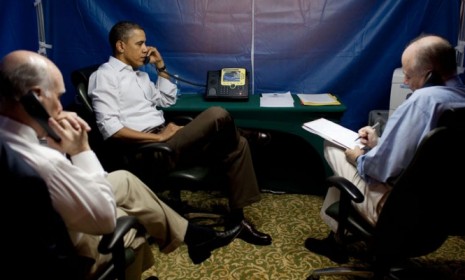The 'Obama Doctrine': Has the president gone neocon in Libya?
The president rode an anti-war platform into office, but now he's embarking on an armed conflict of his own

A free daily email with the biggest news stories of the day – and the best features from TheWeek.com
You are now subscribed
Your newsletter sign-up was successful
After inheriting wars in Iraq and Afghanistan, President Obama has initiated his first new military intervention by authorizing U.S. warships and jets to attack Moammar Gadhafi's forces in Libya. Obama opposed the so-called Bush Doctrine of preemptive and, if necessary, unilateral war against any perceived threat to the security of the United States. Now, Obama has justified the airstrikes against Libya by saying that the U.S. couldn't stand by while a tyrant slaughtered his own people. With so many other autocrats around the world, is Obama pioneering an aggressive new foreign policy that will make neoconservatives proud? (Watch a Euronews report about the attacks)
Yes. Obama has seen the light: President Obama came to power insisting it was time to get out of "Bush's wars," say Gary Schmitt and Thomas Donnelly at The Weekly Standard, and invest the savings at home. But the crisis in Libya made him realize that sometimes there is no substitute for American military power. With the start of his own Middle East war, Obama clearly "now understands" that wielding our might overseas in times of crisis is "the right and necessary thing to do."
The Week
Escape your echo chamber. Get the facts behind the news, plus analysis from multiple perspectives.

Sign up for The Week's Free Newsletters
From our morning news briefing to a weekly Good News Newsletter, get the best of The Week delivered directly to your inbox.
From our morning news briefing to a weekly Good News Newsletter, get the best of The Week delivered directly to your inbox.
No. The "Obama Doctrine" has strict limits: The campaign against Gadhafi definitely marks the beginnings of "an Obama Doctrine for military intervention," says David Corn at Mother Jones, but that doesn't make him a Bush-era neocon. Obama is saying the U.S. will fight "for democracy and humanitarian aims when it is in the nation's interest and when the locals are involved and desire U.S. participation." That's "the Anti-Bush Doctrine" — "we're not cowboys" any more.
"Libya: Obama crafts the Anti-Bush Doctrine"
Multilateralism is what makes this different: Critics say Obama's being reckless by "embarking on a war with a third Muslim country," says Peter Bergen at CNN, but this is "quite a different operation than the 2003 invasion of Iraq." Obama has sworn off the use of U.S. ground troops and, more importantly, he has forged a truly international coalition by waiting until he could secure the active participation of the United Nations and the Arab League. This will remind Arabs "that their biggest enemy is not the United States, but their own rulers."
"Why Libya 2011 is not Iraq 2003"
A free daily email with the biggest news stories of the day – and the best features from TheWeek.com
-
 Minnesota's legal system buckles under Trump's ICE surge
Minnesota's legal system buckles under Trump's ICE surgeIN THE SPOTLIGHT Mass arrests and chaotic administration have pushed Twin Cities courts to the brink as lawyers and judges alike struggle to keep pace with ICE’s activity
-
 Big-time money squabbles: the conflict over California’s proposed billionaire tax
Big-time money squabbles: the conflict over California’s proposed billionaire taxTalking Points Californians worth more than $1.1 billion would pay a one-time 5% tax
-
 ‘The West needs people’
‘The West needs people’Instant Opinion Opinion, comment and editorials of the day
-
 The billionaires’ wealth tax: a catastrophe for California?
The billionaires’ wealth tax: a catastrophe for California?Talking Point Peter Thiel and Larry Page preparing to change state residency
-
 Bari Weiss’ ‘60 Minutes’ scandal is about more than one report
Bari Weiss’ ‘60 Minutes’ scandal is about more than one reportIN THE SPOTLIGHT By blocking an approved segment on a controversial prison holding US deportees in El Salvador, the editor-in-chief of CBS News has become the main story
-
 Has Zohran Mamdani shown the Democrats how to win again?
Has Zohran Mamdani shown the Democrats how to win again?Today’s Big Question New York City mayoral election touted as victory for left-wing populists but moderate centrist wins elsewhere present more complex path for Democratic Party
-
 Millions turn out for anti-Trump ‘No Kings’ rallies
Millions turn out for anti-Trump ‘No Kings’ ralliesSpeed Read An estimated 7 million people participated, 2 million more than at the first ‘No Kings’ protest in June
-
 Ghislaine Maxwell: angling for a Trump pardon
Ghislaine Maxwell: angling for a Trump pardonTalking Point Convicted sex trafficker's testimony could shed new light on president's links to Jeffrey Epstein
-
 The last words and final moments of 40 presidents
The last words and final moments of 40 presidentsThe Explainer Some are eloquent quotes worthy of the holders of the highest office in the nation, and others... aren't
-
 The JFK files: the truth at last?
The JFK files: the truth at last?In The Spotlight More than 64,000 previously classified documents relating the 1963 assassination of John F. Kennedy have been released by the Trump administration
-
 'Seriously, not literally': how should the world take Donald Trump?
'Seriously, not literally': how should the world take Donald Trump?Today's big question White House rhetoric and reality look likely to become increasingly blurred